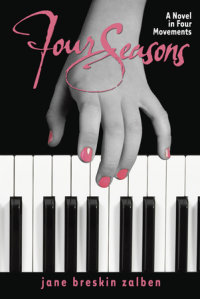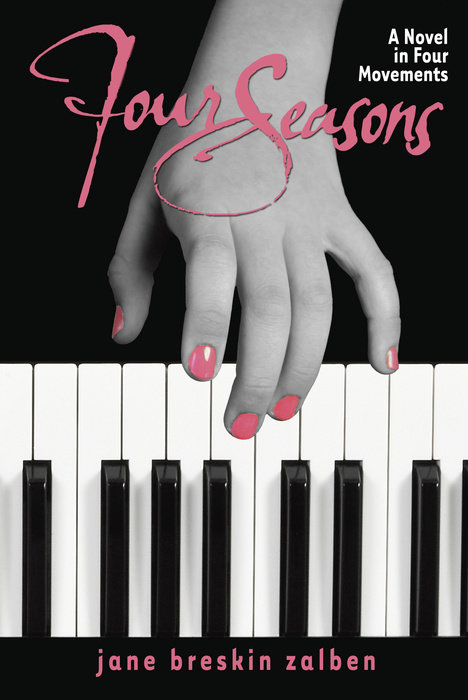March
Four hours of practice a day. At least. That's what they want me to do. By "they" I mean the Pre-College Division music program I go to all day on Saturdays. It is part of a large conservatory, The Juilliard School. Everyone in the know always says "The" and not just plain old "Juilliard." That "the" means it's the only one of its kind in the world. And the truth is, it is.
Even though I aim for four hours, the kids who are homeschooled, or forced, or just plain robots do at least five. The ones who love to play and can't stop, six or more. But I have so much homework from my regular school--where everyone is "gifted" because it's private and the parents nearly poison each other to get their child in--that it's hard to fit in more than three. If my mother knew, I'd probably get chewed out--big-time. Maybe she does, for I believe that, like most mothers, mine sees and hears everything.
When Mom's not doing her voice trills…
March
Four hours of practice a day. At least. That's what they want me to do. By "they" I mean the Pre-College Division music program I go to all day on Saturdays. It is part of a large conservatory, The Juilliard School. Everyone in the know always says "The" and not just plain old "Juilliard." That "the" means it's the only one of its kind in the world. And the truth is, it is.
Even though I aim for four hours, the kids who are homeschooled, or forced, or just plain robots do at least five. The ones who love to play and can't stop, six or more. But I have so much homework from my regular school--where everyone is "gifted" because it's private and the parents nearly poison each other to get their child in--that it's hard to fit in more than three. If my mother knew, I'd probably get chewed out--big-time. Maybe she does, for I believe that, like most mothers, mine sees and hears everything.
When Mom's not doing her voice trills at the piano, I squeeze in at least an hour or more of all twelve major and minor scales, which I count as part of my practice routine--even though I am not supposed to--along with the pieces I am supposed to learn. Miss Pringle, my teacher, picks them out for me for recitals and competitions and end-of-the-year jury evaluations, like the Chopin Prelude in E minor, which is one of the pieces I am studying right now. The prelude is paced and slow. The strewn-together notes make me ache every time I play it. It sounds so beautiful I struggle to hold back tears. By the tenth measure, the melody takes over and goes up ever so slightly in a minor key. My eyes start to become blurry, but I continue. Then, toward the end, I get this uplifting surge. It happens every time I play this piece. Not hear it, actually play it. I guess ol' Chopin does it for me like Billie Holiday does it for Ma.
My mother sings blues as good as Norah Jones, in cramped dark bars near streets named for letters of the alphabet. "Years ago, when it was called Alphabet City, it was like the Wild West," Mom told me. "But now that the Lower East Side's grunginess has gotten hip and upscale, everybody who likes my kind of music goes down there."
Mom's weekday shows start around ten or eleven at night, when downtown really starts to wake up. Since on school nights I'm in bed by then, I've never seen one. My mother trained as an opera singer. But that's a whole other story.
She says, "I need to perform to stay alive. I don't care if it's at some bar on Avenue C instead of the Metropolitan Opera House. Music's like breathing air."
Sometimes I half believe her.
Last night before she left, I asked, "When can I go to one of your gigs already?"
"Maybe on your thirteenth birthday, Alley Cat."
"But that's in June! Over two months away!"
"Patience is a virtue."
"Trust me, Ma, anyone who plays classical music has a whole lot of patience."
"If anyone knows, I know." She sighed and started to gather up sheet music for her accompanist. When she noticed me staring at the word allegro at the top of a song, she said, "You know we named you Allegra because Dr. Goldstein needed a catcher's mitt the night you were born." Allegro means a brisk and rapid tempo.
"Thanks for sharing that with me for the millionth time, Ma." I gave her a major eye roll.
She plowed on. "Allegro's the opening for the concertos of Vivaldi's Four Seasons. Dad was performing it the night you popped out. I guess you were destined to become a musician."
"Or a baseball player." I filled in one of Dad's lines in the familiar story, since he was away on tour.
My name might be Allegra, but mostly everyone calls me Ally.
Mom sometimes calls me Alley Cat after a dance Grandma does at the Y. Dad's mother has lived in her own place on the bottom floor of our brownstone ever since Grandpa died of a heart attack a few years ago. Grandma found him on their bedroom floor when she came back from her book club. She still feels sick about it, wondering, Would things have been different if only I had been there? She babysits me, if you could call it that--I'm way past the sitting age--when my parents are off doing their thing. I also suspect it's an excuse to come over because she's lonely without him, especially at dinnertime.
My father's the first violinist in a group called the Marduvian String Quintet, which means (a) he gets to play the hard parts, and (b) there are five instead of the usual four people in a group, which would have made it a quartet--totally weird in the music world--Dad named it after my mother's family, Marduvian, which sounds more exotic than ours, Katz. Katz plants us in the heart of the Upper West Side. Near Zabar's. And lox and bagels. And walking distance from Lincoln Center--"the dream of all performing artists," say my mother and father.
Parents come to New York City from all over the world so their child can study with some hotshot teacher at Juilliard. Fifty to ninety young musicians get in a year, depending on who applies. A lot of families are pulled apart--where one parent stays behind with the rest of the family while the other lets their son or daughter follow a dream. Whose dream it is, I'm not always sure, but the one thing I know is that I'm lucky to live only ten blocks away.

